| Listing 1 - 10 of 14 | << page >> |
Sort by
|
Book
ISBN: 9789024450251 Year: 2023 Publisher: Amsterdam Boom
Abstract | Keywords | Export | Availability | Bookmark
 Loading...
Loading...Choose an application
- Reference Manager
- EndNote
- RefWorks (Direct export to RefWorks)
Het zeer populaire zelfhulpboek Negatief Zelfbeeld van Manja de Neef uit 2010 is nu volledig geactualiseerd in deze herziene editie. Een negatief zelfbeeld is een vaste negatieve overtuiging over jezelf die tot uiting komt in je denken, in je gevoel en in je gedrag. Het heeft invloed op veel gebieden van je leven, brengt nogal wat beperkingen met zich mee en gaat meestal niet vanzelf over. Als het beeld van jezelf negatief is, dan dringt positieve informatie uit de omgeving niet (goed) door. De vaste overtuiging niets waard te zijn, er niet bij te horen of niet gezien te worden kan je persoonlijke ontwikkeling behoorlijk in de weg zitten. Hoe kun je leren om anders naar jezelf te kijken. Dit boek biedt een stappenplan om het negatieve denken te doorbreken. Aan de hand van oefeningen, opdrachten en praktijkvoorbeelden leert de lezer een genuanceerd beeld van zichzelf op te bouwen. De auteur, Manja de Neef, is expert op het gebied van zelfbeeld. Zij begrijpt als geen ander hoe moeilijk het is om tegen een bestaand negatief zelfbeeld op te boksen. Negatief zelfbeeld is een warm en troostrijk boek voor mensen die te streng voor zichzelf zijn. Een praktisch zelfhulpboek bij een negatief zelfbeeldDe Neef is gespecialiseerd in het schrijven van zelfhulpboeken en het uitwerken van methodieken die mensen op zichzelf kunnen toepassen. Negatief zelfbeeld is een mooi voorbeeld van de combinatie van zowel haar praktijkervaring als haar ervaring met concrete stappen die gezet moeten worden om dit probleem aan te pakken. Met dit boek heb je een uiterst praktische gids in handen, die je kan helpen om een positief zelfbeeld te vormen. Negatief zelfbeeld kan binnen een behandeling gebruikt worden, maar de methodiek is ook zeer geschikt om zelfstandig te doorlopen.
316.63 --- #KVHB:Persoonlijkheidspsychologie --- #KVHB:Zelfbeeld --- Persoonlijkheidsleer --- Zelfbeeld --- #SBIB:316.8H30 --- persoonlijkheidspsychologie --- zelfbeeld --- 316.63 Sociaal bewustzijn. Zelfconcept --- Sociaal bewustzijn. Zelfconcept --- Professies en methoden in het welzijnswerk: sociaal werk, vrijwilligerswerk, hulpverleningsmethoden … --- Psychology --- psychologie --- psychiatrie --- therapie --- Cognitive psychology --- cognitieve psychologie
Book
ISBN: 9781785333385 9781782384533 1782384537 1785333380 1782384545 1322170150 Year: 2014 Publisher: New York: Oxford: Berghahn,
Abstract | Keywords | Export | Availability | Bookmark
 Loading...
Loading...Choose an application
- Reference Manager
- EndNote
- RefWorks (Direct export to RefWorks)
Nostalgia is intimately connected to the history of the social sciences in general and anthropology in particular, though finely grained ethnographies of nostalgia and loss are still scarce. Today, anthropologists have realized that nostalgia constitutes a fascinating object of study for exploring contemporary issues of the formation of identity in politics and history. Contributors to this volume consider the fabric of nostalgia in the fields of heritage and tourism, exile and diasporas, postcolonialism and postsocialism, business and economic exchange, social, ecological and religious movem
Nostalgia --- #SBIB:39A3 --- #SBIB:316.7C121 --- 316.63 --- 316.63 Sociaal bewustzijn. Zelfconcept --- Sociaal bewustzijn. Zelfconcept --- Social aspects. --- Antropologie: geschiedenis, theorie, wetenschap (incl. grondleggers van de antropologie als wetenschap) --- Cultuursociologie: gedragspatronen, levensstijl --- Nostalgie --- Social aspects --- Cross-cultural studies --- Etudes transculturelles --- Aspect social --- Emotions --- Kulturvergleich. --- Nostalgie. --- Postkommunismus. --- Sozialanthropologie. --- Theoriendynamik. --- Anthropological aspects. --- Osteuropa. --- Türkei. --- Nostalgia - Cross-cultural studies --- Nostalgia - Social aspects

ISBN: 0691116369 0691050619 1400814642 9786612087042 1282087045 1400824699 9781400824694 9781400814640 9781282087040 9780691050614 9780691116365 9780691116365 Year: 2000 Publisher: Princeton, NJ : Princeton University Press,
Abstract | Keywords | Export | Availability | Bookmark
 Loading...
Loading...Choose an application
- Reference Manager
- EndNote
- RefWorks (Direct export to RefWorks)
Adam Seligman, one of our most important social thinkers, continues the incisive critique of modernity he began in his previously acclaimed The Idea of Civil Society and The Problem of Trust. In this provocative new work of social philosophy, Seligman evaluates modernity's wager, namely, the gambit to liberate the modern individual from external social and religious norms by supplanting them with the rational self as its own moral authority. Yet far from ensuring the freedom of the individual, Seligman argues, "the fundamentalist doctrine of enlightened reason has called into being its own nemesis" in the forms of ethnic, racial, and identity politics. Seligman counters that the modern human must recover a notion of authority that is essentially transcendent, but which extends tolerance to those of other--or no--faiths. Through its denial of an authority rooted in an experience of transcendence, modernity fails to account for individual and collective moral action. First, deprived of a sacred source of the self, depictions of moral action are reduced to motives of self interest. Second, dismissing the sacred leaves the resurgence of religious movements unexplained. In this rigorous and imaginative study, Seligman seeks to discover a durable source of moral authority in a liberalized world. His study of shame, pride, collective guilt, and collective responsibility demonstrates the mutual relationship between individual responsibility and communal authority. Furthermore, Seligman restores the indispensable role of religious traditions--as well as the features of those traditions that enhance, rather than denigrate, tolerance. Sociologists, political theorists, moral philosophers, and intellectual historians will find Seligman's thesis enlightening, as will anyone concerned with the ethical and religious foundations of a tolerant society.
316.63 --- Authority --- Self --- Transcendence (Philosophy) --- 316.37 --- 316.37 Identiteit. Individu en maatschappij. Persoonlijkheid --- Identiteit. Individu en maatschappij. Persoonlijkheid --- Philosophy --- Personal identity --- Consciousness --- Individuality --- Mind and body --- Personality --- Thought and thinking --- Will --- Political science --- Authoritarianism --- Consensus (Social sciences) --- 316.63 Sociaal bewustzijn. Zelfconcept --- Sociaal bewustzijn. Zelfconcept --- Self. --- Authority. --- Transcendence (Philosophy).
Book
ISBN: 9789085069645 Year: 2020 Publisher: Amsterdam Boom
Abstract | Keywords | Export | Availability | Bookmark
 Loading...
Loading...Choose an application
- Reference Manager
- EndNote
- RefWorks (Direct export to RefWorks)
Als het beeld van jezelf negatief is, dan dringt positieve informatie uit de omgeving niet door. De vaste overtuiging niets waard te zijn, er niet bij te horen of niet gezien te worden kan je persoonlijke ontwikkeling behoorlijk in de weg zitten. hoe kun je leren om anders naar jezelf te kijken? Dit boek biedt een methode om het negatieve denken te doorbreken. Stapsgewijs, en met behulp van oefeningen en opdrachten, leert de lezer een stevig en genuanceerd beeld van zichzelf op te bouwen. De auteur baseert zich op jarenlange praktijkervaring. Dit boek kan binnen een behandeling gebruikt worden, maar ook zelfstandig.
316.63 --- #KVHB:Persoonlijkheidspsychologie --- #KVHB:Zelfbeeld --- Persoonlijkheidsleer --- Zelfbeeld --- #SBIB:316.8H30 --- persoonlijkheidspsychologie --- zelfbeeld --- 316.63 Sociaal bewustzijn. Zelfconcept --- Sociaal bewustzijn. Zelfconcept --- Professies en methoden in het welzijnswerk: sociaal werk, vrijwilligerswerk, hulpverleningsmethoden … --- 607.7 --- perfectionisme --- Autotherapie --- 417 --- identiteit --- zelfvertrouwen --- Zelfbeeld (zelfontplooiing, zelfvertrouwen, zelfwaardering) --- 415.3 --- Psychology --- Cognitive psychology --- gedragstherapie --- cognitieve therapie --- PXL-Central Office 2014 --- gedragspsychologie --- zelfhulp --- zelfzorg
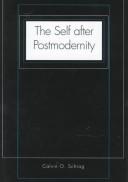
ISBN: 0585382255 9780585382258 0300068425 9780300068429 0300078765 9780300078763 Year: 1999 Publisher: [Place of publication not identified] Yale University Press
Abstract | Keywords | Export | Availability | Bookmark
 Loading...
Loading...Choose an application
- Reference Manager
- EndNote
- RefWorks (Direct export to RefWorks)
Self (Philosophy) --- Postmodernism. --- Postmodernism --- 316.323.9 --- 316.63 --- 316.63 Sociaal bewustzijn. Zelfconcept --- Sociaal bewustzijn. Zelfconcept --- 316.323.9 Postmoderne maatschappij. Sociologie van het postmodernisme --- Postmoderne maatschappij. Sociologie van het postmodernisme --- Philosophy --- Post-modernism --- Postmodernism (Philosophy) --- Arts, Modern --- Avant-garde (Aesthetics) --- Modernism (Art) --- Philosophy, Modern --- Post-postmodernism
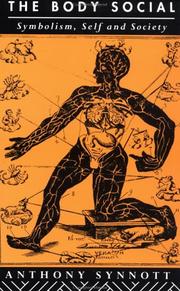
ISBN: 1134850263 128033620X 9786610336203 020320154X 9780203201541 0415103592 0415062969 9781134850266 9781280336201 6610336202 9781134850211 9781134850259 9781138147997 9780415103596 1134850255 Year: 1993 Publisher: London ; New York : Routledge,
Abstract | Keywords | Export | Availability | Bookmark
 Loading...
Loading...Choose an application
- Reference Manager
- EndNote
- RefWorks (Direct export to RefWorks)
In this captivating book Anthony Synnott explores a subject which has been woefully ignored: our bodies. He surveys the history for thinking about the body and the senses, then focuses on specific themes: gender, beauty, the face, hair, touch, smell and sight. He concludes with a review of classical and contemporary theories of the body and the senses. Thinking about the body will never be the same after reading this book.
Human body --- Human beings --- Homo sapiens --- Human race --- Humanity (Human beings) --- Humankind --- Humans --- Man --- Mankind --- People --- Hominids --- Persons --- Social aspects. --- #SBIB:309H524 --- 316.37 --- 316.63 --- 316.63 Sociaal bewustzijn. Zelfconcept --- Sociaal bewustzijn. Zelfconcept --- 316.37 Identiteit. Individu en maatschappij. Persoonlijkheid --- Identiteit. Individu en maatschappij. Persoonlijkheid --- Social aspects --- Audiovisuele communicatie: semiotiek --- Sociology of culture
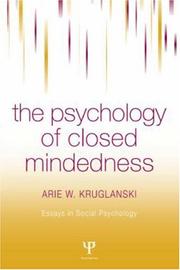
ISBN: 0863775802 0203506960 9780203506967 1280168803 9781280168802 9781135471545 9781135471491 9781135471538 9780863775802 9781138004320 Year: 2004 Publisher: New York (N.Y.) Psychology Press
Abstract | Keywords | Export | Availability | Bookmark
 Loading...
Loading...Choose an application
- Reference Manager
- EndNote
- RefWorks (Direct export to RefWorks)
The fundamental phenomenon of human closed-mindedness is treated in this volume. Prior psychological treatments of closed-mindedness have typically approached it from a psychodynamic perspective and have viewed it in terms of individual pathology. By contrast, the present approach stresses the epistemic functionality of closed-mindedness and its essential role in judgement and decision-making. Far from being restricted to a select group of individuals suffering from an improper socialization, closed-mindedness is something we all experience on a daily basis. Such mundane situational conditions
Social psychology --- Judgment --- Reasoning --- Prejudices. --- Social perception. --- Characters and characteristics --- Personality --- Jugement --- Raisonnement --- Préjugés --- Perception sociale --- Personnages --- Personnalité --- Prejudices --- Social perception --- #PBIB:2005.3 --- 316.63 --- 316.64 --- Sociaal bewustzijn. Zelfconcept --- Maatschappelijke attitudes --(sociale psychologie) --- Sociale psychologie --- handboeken en inleidingen --- handboeken en inleidingen. --- 316.64 Maatschappelijke attitudes --(sociale psychologie) --- 316.63 Sociaal bewustzijn. Zelfconcept --- Préjugés --- Personnalité --- Personality. --- Cognition, Social --- Interpersonal perception --- Social cognition --- Interpersonal relations --- Perception --- Social cognitive theory --- Bias (Psychology) --- Prejudgments --- Prejudice --- Prejudices and antipathies --- Attitude (Psychology) --- Emotions --- Judgment.
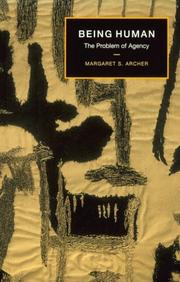
ISBN: 9780521791755 9780511488733 9780521795647 0521795648 0521791758 0511488734 0511046898 051115366X 051132801X 1280430079 051117411X 1107121663 0511013108 9780511013102 0511013116 9780511013119 0511031629 9780511031625 9780511046896 9780511328015 9781280430077 9786610430079 6610430071 9781107121669 Year: 2000 Publisher: Cambridge, U.K. ; New York : Cambridge University Press,
Abstract | Keywords | Export | Availability | Bookmark
 Loading...
Loading...Choose an application
- Reference Manager
- EndNote
- RefWorks (Direct export to RefWorks)
Humanity and the very notion of the human subject are under threat from postmodernist thinking which has declared not only the 'Death of God' but also the 'Death of Man'. This book is a revindication of the concept of humanity, rejecting contemporary social theory that seeks to diminish human properties and powers. Archer argues that being human depends on an interaction with the real world in which practice takes primacy over language in the emergence of human self-consciousness, thought, emotionality and personal identity - all of which are prior to, and more basic than, our acquisition of a social identity. This original and provocative new book from leading social theorist Margaret S. Archer builds on the themes explored in her previous books Culture and Agency (CUP 1988) and Realist Social Theory (CUP 1995). It will be required reading for academics and students of social theory, cultural theory, political theory, philosophy and theology.
philosophical anthropology --- identité --- Agent (Philosophy). --- Philosophical anthropology. --- Agent (Philosophy) --- Philosophical anthropology --- identiteit --- 316.37 --- 316.63 --- 316.63 Sociaal bewustzijn. Zelfconcept --- Sociaal bewustzijn. Zelfconcept --- 316.37 Identiteit. Individu en maatschappij. Persoonlijkheid --- Identiteit. Individu en maatschappij. Persoonlijkheid --- Anthropology, Philosophical --- Man (Philosophy) --- Civilization --- Life --- Ontology --- Humanism --- Persons --- Philosophy of mind --- Agency (Philosophy) --- Agents --- Person (Philosophy) --- Act (Philosophy) --- Philosophy --- Political philosophy. Social philosophy --- identity --- sociale filosofie --- Law of real property --- Social Sciences --- Sociology
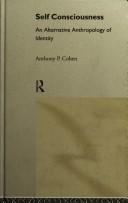
ISBN: 1134889321 1280321326 0203418980 9780203418987 9780415083232 0415083230 9780415083249 0415083249 0415083230 0415083249 9781134889327 9781280321320 9781134889273 9781134889310 9781138141100 1134889313 Year: 1994 Publisher: London ; New York : Routledge,
Abstract | Keywords | Export | Availability | Bookmark
 Loading...
Loading...Choose an application
- Reference Manager
- EndNote
- RefWorks (Direct export to RefWorks)
Traditionally the self and the individual have been treated as micro-versions of larger social entities by the social sciences in general, and by anthropology in particular. In Self Consciousness, Cohen examines this treatment of the self, arguing that this practice has resulted in the misunderstanding of social aggregates precisely because the individual has been ignored as a constituent element. By acknowledging the individual's self awareness as author of their own social conduct and of the social forms in which they participate, this informs social and cultural processes rather th
Personality and culture --- Self --- Identity (Philosophical concept) --- Group identity --- Collective identity --- Community identity --- Cultural identity --- Social identity --- Identity (Psychology) --- Social psychology --- Collective memory --- Identity --- Philosophy --- Comparison (Philosophy) --- Resemblance (Philosophy) --- Personal identity --- Consciousness --- Individuality --- Mind and body --- Personality --- Thought and thinking --- Will --- 316.63 --- 316.63 Sociaal bewustzijn. Zelfconcept --- Sociaal bewustzijn. Zelfconcept --- Ego (Psychology) --- Cross-cultural studies --- Identité collective --- Identité --- Personnalité et culture --- Moi (Psychologie) --- Cross-cultural studies. --- Etudes transculturelles
Book
Abstract | Keywords | Export | Availability | Bookmark
 Loading...
Loading...Choose an application
- Reference Manager
- EndNote
- RefWorks (Direct export to RefWorks)
In dit uitdagende boek delen 100 topexperts in de positieve psychologie, van IJsland tot Zuid-Afrika en van China tot Australië, de kennis die zij bezitten over geluk. Deze moderne wetenschap maakte het voorbije decennium een grote opgang. Geen filosofische of spirituele beschouwingen, maar inzichten die gebaseerd zijn op wereldwijd wetenschappelijk onderzoek.
Philosophical anthropology --- Philosophy and psychology of culture --- cultuurpsychologie --- geluk --- Conduct of life --- Ethics [Practical ] --- Levenswijze --- Mode de vie --- Morals --- Personal conduct --- Succes --- Success --- Succès --- positieve psychologie --- psychologie --- Geluk --- Psychologie --- Emoties --- Vaardigheden talenten communicatie communiceren wendbaarheid veerkracht --- 316.63 --- #SBIB:17H20 --- #SBIB:316.7C122 --- 070 Psychologie --- 15 --- AA / International- internationaal --- 172 --- 415.3 --- Positieve psychologie --- levenskunst --- 159.942 --- Onderzoek --- S20100626.JPG --- #GGSB: Psychologie --- #KVHB:Geluk --- #KVHB:Positieve psychologie --- Psychologie Psychologie --- Personnalité Persoonlijkheid --- Comportement psychologique du personnel Psychologisch gedrag van het personeel --- Sociaal bewustzijn. Zelfconcept --- Sociale wijsbegeerte: algemeen --- Cultuursociologie: overtuigingen, waarden en houdingen --- Psychologie. --- Levenskunst --- Uitvoerende functies --- 159.94 --- 316.63 Sociaal bewustzijn. Zelfconcept --- Happiness --- Miscellanea --- toegepaste filosofie --- Emotie --- Man --- Volwassene
| Listing 1 - 10 of 14 | << page >> |
Sort by
|

 Search
Search Feedback
Feedback About UniCat
About UniCat  Help
Help News
News